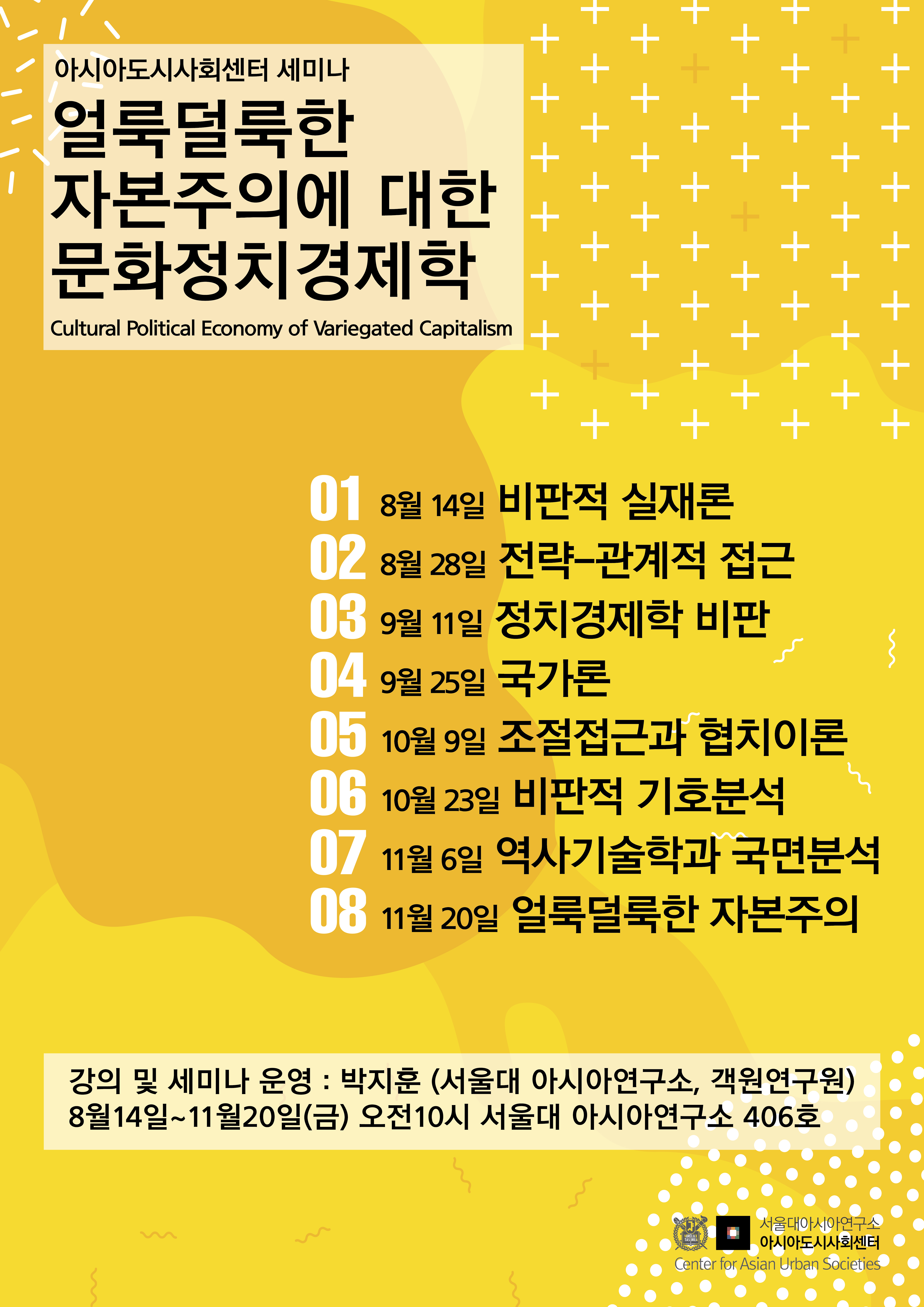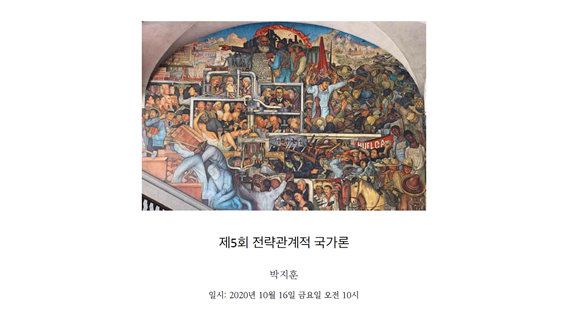Cultural Political Economy of Variegated Capitalism: The regulation approach and governance theory
- Date: October 16th, Friday, 2020 10:00-12:00
- Online seminar via Zoom
※ From the fifth event, the date has been postponed a week. Below is the modified schedule.
(5) The regulation approach and governance theory: October 16th
(6) Critical discourse analysis and critical semiotic analysis: October 30th
(7) Conjunctural analysis: November 13th
(8) The variegation approach: November 27th
SNUAC’s Center for Asian Urban Societies has programmed a seminar on the basics of <Cultural Political Economy of Variegated Capitalism> on every other Friday starting from August 14th.
In this seminar, we plan to overview the components of cultural political economy: (1) critical realism, (2) the strategic-relational approach, (3) critique of political economy, (4) the regulation approach and governance theory, (5) state theory, (6) critical discourse analysis and critical semiotic analysis, (7) conjunctural analysis, (8) the variegation approach.
The seminar will proceed with the lectures (mostly explanations of the background) by the host and presentations and discussion by participants. While this will start out in the form of a reading club, we are hoping that it will grow into a research network in the future. We ask all graduate students and researchers who are interested in the critique of political economy, critical cultural political economy and critical cultural studies to join us.
※ Inquiries : Kihoon Choi (geozealot@gmail.com)
Jihoon Park
Researcher at Sogang University Institute of Social Sciences. Visiting researcher at SNUAC. Earned a Ph.D. with “A Cultural Political Economy of South Korea’s Development Model in Variegated Capitalism” under the guidance of Bob Jessop and Ngai-Ling Sum at Lancaster University.
※ Registration has closed.
This seminar was held on October 16th as the fifth meeting of the eight to be held and was on state theory. The host of the seminar, Jihoon Park (SNUAC visiting researcher) introduced Bob Jessop’s major writings and explained the (1) state theory of Karl Marx and Friedrich Engels, (2) state theory in Bob Jessop’s Nicos Poulantzas, State Theory and The State (3) and the positions on specifics of East Asian countries as shown in Ngai-Ling Sum and Jihoon Parks papers.
Dr. Park explained that Bob Jessop believed both Marx and Engels had failed to develop a coherent and perfect analysis of the capitalist state, and that he put forth his discussion not to attempt a singular essence of Marxist theory on the state but rather to emphasize the breaks and gaps in their research. And he emphasized that the state is a type of social relation and that it cannot be explained as a singular system as its result fluctuates depending on diverse and accidental causes and phenomena. Lastly, he discussed Ngai-Ling Sum’s argument to show Jessop’s state theory stopping at Western European centralism, and that it cannot have the universality as a general state theory. He argued that East Asian states should critically accept this theory through their exceptional situations.
After Dr. Park’s explanation, presenter Kihoon Choi (Master’s graduate, Dept. of Geography Education) gave his interpretation on Bob Jessop’s State Power (2008), the part in which he explains the strategic-relational state theory in connection to the specific situation of globalization. Jessop especially argues that temporality and spatiality should be emphasized together in relation to the structure/strategic actions of the state upon globalization and that in capitalism and globalization, there are continued attempts to conceal the paradox and coevolution of this spatiotemporality. The discussion was concluded with comments on how the state actively engages in a different world system in such a context as well as overcome the crisis due to globalization through traditional thinking based on land territory, thus showing the complex and diverse strategies.
This fifth seminar brought in the abstract discussions dealt in the previous four seminars and developed them into a further concrete dimension. Especially the seminar provided an opportunity to think about how the strategic-relational approach can be connected to the concept of state.


